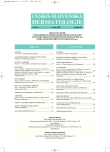New Findings in Acne Pathogenesis
Nové poznatky v etiopatogenezi acne vulgaris
V etiopatogenezi akné stále přibývají další informace, které doplňují neobjasněné příčiny vzniku a chronického průběhu tohoto onemocnění. Z velké části je to umožněno rozvojem imunohistochemické techniky. V článku je věnována pozornost problematice keratinizace, hyperseborey a roli mikroorganismů, včetně působení androgenů na tyto základní patogenetické faktory. Práce doplňuje samostatnou práci „Terapeutické postupy v dermatologii – Acne vulgaris“ (Čes.-slov. Derm. 5, 2006).
Klíčová slova:
acne vulgaris – keratinizace – seborea – mikroorganismy – androgeny
Authors:
J. Rulcová
Authors‘ workplace:
Dermatovenerologická klinika LF Masarykovy univerzity a Fakultní nemocnice Brno
přednostka prof. MUDr. Alena Pospíšilová, CSc.
Published in:
Čes-slov Derm, 82, 2007, No. 4, p. 184-189
Category:
Innovations in Medicine
Overview
There are continuously increasing information on acne pathogenesis which bring new views on yet unexplained causes of origin and chronicity of the disease. The great deal of these infomation is due to the progress in immunohistochemistry techniques. This publication focuses on keratinization, hyperseborrhea and microorganisms’ role including influence of androgens on these basic pathogenetic factors. The article supplements already published separate paper in this journal: „Therapeutic principles in dermatology – Acne vulgaris” (Čes.-slov. Derm. 5, 2006).
Key words:
acne vulgaris – keratinization – seborrhea – microorganism – androgens
Labels
Dermatology & STDs Paediatric dermatology & STDsArticle was published in
Czech-Slovak Dermatology

2007 Issue 4
Most read in this issue
- Dermatoses of Pregnancy
- Malignant Atrophic Papulosis (Degos’ disease)
- Skin Elasticity Measurement
- Melanoma Clitoridis and Sentinel Lymph Node Biopsy
